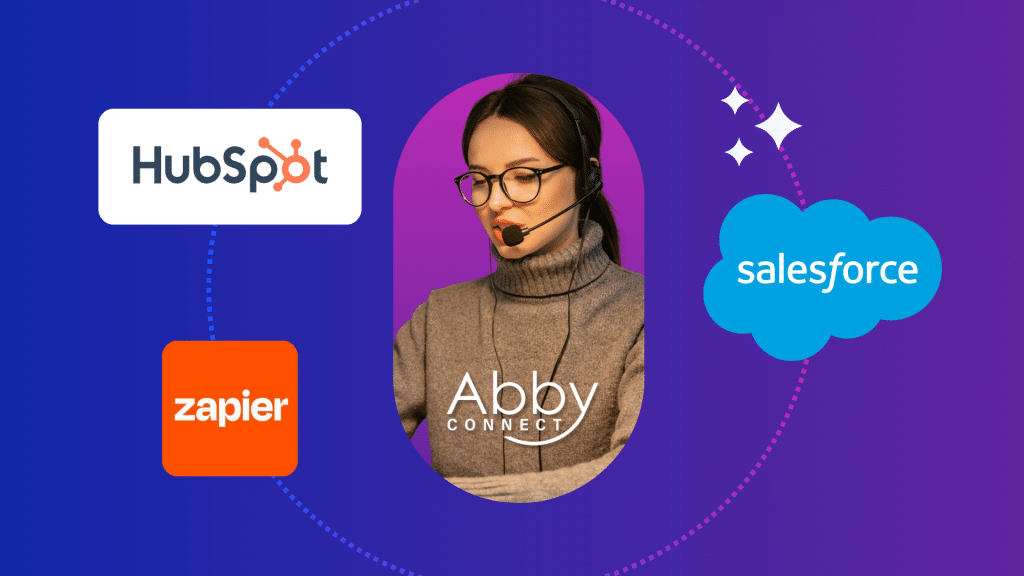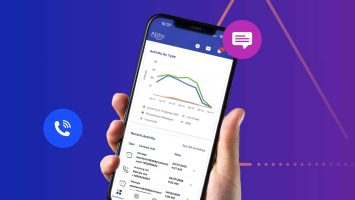Running a business can feel like spinning plates sometimes, especially for small and rapidly growing companies. You’re handling sales, marketing, customer support, and somehow you’re supposed to answer every phone call, too. If you’re like most small business owners, you know the frustration of missed calls and lost opportunities all too well.
An AI receptionist solution, like the one offered by Abby, can eliminate unanswered calls, prevent missed leads, improve the customer experience, and enhance your company’s reputation.
A quick summary of this article:
- AI receptionists handle calls automatically using speech recognition and conversational AI.
- Integrating AI receptionist services with marketing automation enables instant lead capture, faster responses, personalized follow-ups, and improved conversion rates.
- AI receptionists save businesses time and money by improving efficiency and reducing costs.
- Data insights and analysis help track caller behavior, measure engagement, and continuously refine marketing workflows.
- Seamless integrations with platforms like Salesforce, HubSpot, and Zapier make setup simple, even for those without technical expertise.
What Is an AI Receptionist?
An AI receptionist is a virtual call handling agent powered by natural language processing, speech recognition, and conversational AI. Instead of having to fight through a phone tree or long hold times, callers get to speak to a responsive system that answers questions, routes calls, schedules appointments, and captures information.
Abby’s AI receptionist is built in-house and backed by 20 years of receptionist expertise, and can engage in natural conversations without scripts or menus. Every call is answered within one ring, ensuring that callers never feel ignored. The system also generates real‑time transcripts, call summaries, and sentiment scores, all accessible through the AbbyGO mobile app or Abby portal. With these data points, you can gauge context, keywords, and caller intent, making them ideal to support your marketing automation processes.
What makes AI receptionists different from traditional call‑answering services?
- Scalability: The AI can handle multiple calls simultaneously, adjusting to changes in call volume.
- Consistency: Every caller experiences a customized workflow and gets accurate information.
- 24‑hour availability: AI receptionists are always on, which is essential when over half of consumers expect prompt responses at any time of day.
- Easy integration: Call data can be pushed directly into Customer Relationship Management (CRM) systems and marketing tools.
AI receptionists can work alone or alongside human receptionists. Abby’s human + AI model pairs AI technology with a team of live receptionists, so that complex or sensitive calls receive human care when needed. This approach gives you the best of both worlds, combining cost‑effective efficiency and personalized service.
Do You Need an AI Receptionist Service?
Missed calls translate to lost opportunities. Research shows that:
- 62% of calls to small businesses go unanswered.
- 85% of callers who don’t connect on the first try won’t call back.
- 52% of customers expect a response within an hour, regardless of the time of day.
If your business has a high volume of unanswered calls, and you can’t afford the overhead involved in hiring a full-time receptionist, an AI receptionist with features like Abby’s could be the answer.
“In the mortgage business, if you miss a call, you miss an opportunity, plain and simple. Since bringing in Abby’s AI Receptionist, we’ve captured every lead without missing a beat. It handles a huge volume of calls efficiently and professionally, making sure our clients always speak with someone or get the help they need. It’s like adding a 24/7 front desk without the overhead. We couldn’t be happier.”
— Brandon P., VP of Client Relations, ClearPath Mortgage Group
Why Integrate Your AI Receptionist With Marketing Automation?
Marketing automation tools can help you nurture leads and bolster your revenue, but they need good data to accomplish that. Integrating an AI receptionist with your marketing stack closes the loop by capturing call details and triggering timely, personalized messages.
1. Capture More Leads
Abby’s AI receptionist answers quickly and gathers caller details, turning what would have been an abandoned call into a captured lead. Once recorded, that information flows into your CRM and marketing platform, triggering personalized follow‑ups.
According to marketing automation research, companies that adopt automation experience an average increase of up to 451% in qualified leads.
2. Respond Faster
Consumers don’t like waiting. Studies show the average caller is willing to hold for only 45 seconds, and 70% will hang up after one minute. When the AI receptionist feeds data to marketing automation, follow‑up communications can be triggered instantly.
For example, a new prospect might receive a “thank you” email within minutes of hanging up. Quick responses show professionalism and improve your chance of converting leads.
3. Personalize at Scale
Marketing automation lets you send tailored content based on behavioral triggers. By integrating AI call data you can segment leads more accurately.
Abby’s AI receptionist provides call transcripts, so you can place callers into appropriate nurture campaigns. For example, someone calling to ask about costs could be placed into a pricing education sequence (a series of follow-up messages that gradually explain your value and justify your pricing), while a support caller might enter a customer retention track (targeted communications designed to address concerns and prevent existing customers from leaving). Personalized content can significantly improve conversion rates.
4. Improve Efficiency and Reduce Costs
Hiring a full‑time receptionist costs around $35,000–$50,000 a year, but Abby’s AI receptionist pricing plans start at $99 per month.
Businesses using AI receptionists save hours that would otherwise be spent taking calls. Marketing automation multiplies those savings by automating repetitive marketing tasks, reducing marketing overhead by 12.2% and increasing sales by up to 14.5%. Combining both technologies means your team can focus on high‑value activities like closing deals and nurturing relationships.
5. Generate Insights for Continuous Improvement
Both the Abby AI Receptionist and marketing platforms capture rich data. When these systems integrate, you get a unified view of customer journeys from the first phone call through to conversion. You can track call volumes, topics, outcomes, and subsequent engagement to see which campaigns drive the best results.
Layering call data gives you even greater control over your pipeline; 91 % of marketers report that marketing automation helps them achieve their objectives.
How Does an Integrated AI Receptionist & Marketing System Work?
Integrating an AI receptionist with marketing automation involves four components:
- AI receptionist/call handling: The AI system answers calls, greets callers in a human‑sounding voice, and collects essential information. The AI also understands tone, which is helpful for sentiment scoring.
- Call data processing: After the call, the AI generates transcripts and call summaries. With human + AI models, a live receptionist reviews or continues the call if necessary. The system tags calls by topic (e.g., sales inquiry, support, billing) and determines sentiment (positive, neutral, negative).
- Integration layer: Platforms like Zapier, HubSpot, or Salesforce connect the call data to your marketing tools. Using triggers such as “new call logged” or “call sentiment score,” you can automate actions like sending an email, creating a CRM task, or updating a deal stage. Abby’s integrations include connections with Salesforce, HubSpot, LeadConnector, ActiveCampaign, Lawmatics, Mailchimp, Shopify, and more.
- Marketing automation platform: Once the data is in your CRM or marketing tool, you can build workflows that nurture leads. These might include sending a welcome email, scheduling a sales call, or adding the lead to a drip sequence. Over time, you can measure which call sources and campaigns produce the highest ROI.




